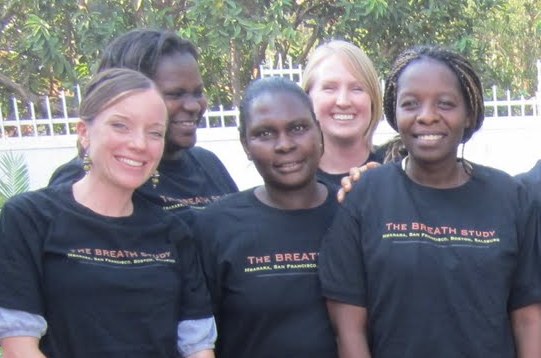Spotlight on…Winnie Muyindike
Based on an interview with Dr. Winnie Muyindike, MBChB, MMED, Director of ISS Clinic, Mbarara University of Science and Technology and a study investigator in Uganda.
Where are you originally from?
I am originally from Kampala, which is located in central Uganda, but have lived and worked in Mbarara for the past 15 years. I prefer Mbarara, as Kampala is very congested with cars.
What led you to become a clinician?
My decision to become a doctor was guided by my performances in the sciences in advanced level exams, and my older brother, who was attending medical school. Additionally, I wanted to be in a position where I could care for people. I was a general clinician for 8 years and then became a specialist in internal medicine. Towards the end of 2006, I became the director of the Mbarara University HIV clinic. My position includes making sure clinical, academic and administrative duties within the HIV clinic run smoothly and that our patients are taken care of well within the available resources and National guidelines. We partner with other universities to do research and mentor health workers in lower health facilities to ensure improved quality in clinical services delivered.
How did you become involved in alcohol use research?
I met Judy (Hahn) about 5 years ago when she was doing research on alcohol and HIV with other physicians at the clinic. When the other physicians moved to different locations and I moved into the HIV clinic, we were introduced to each other by Ms. Nneka (Emenyonu) and our research collaboration began. I was new to research and was very interested in learning.
How has becoming a researcher impacted you as a clinician?
The research that we are currently conducting on alcohol consumption in HIV clients using self- report and biomarkers has enabled us to realize the magnitude of the problem, its associated conditions such as depression. We and we have noted the gaps in our clinical service delivery in regard to handling HIV clients with unhealthy alcohol consumption whichhence allowsing us to plan for the future. We saw that there were gaps in the quality of our messages and care. It got us thinking, “What can we do better to improve the situation?” There are things we can do within our systems that don’t require money, which is much easier to do than those that do require funding. For example, we can alter the messages that we are giving our patients. We don’t really need to ask them to abstain from drinking; we can instead ask them to reduce alcohol consumption and weigh the benefits versus. negative effects. We are also planning to conduct interventional research in the future, possibly brief interventions that could be translated into actual clinical practice after analyzing their efficacy and cost effectiveness.
What is it like being the director of the Immune Suppression Syndrome Clinic?
It is a bit of work. At the same time, when I know that things are running smoothly for my patients and the staff, I am happy. It is a commitment that requires being focused, knowing the current clinical performance, comparing it against the nNational standards and trying to bridge the gaps as we strive for continuous quality improvement. You must understand the limitations of both the patient’s expectations and staff capabilities to deliver their best. It is balance.
Why is the research that URBAN ARCH is carrying out in Uganda important? What impact could we have with this research?
I think it is important on several grounds. Alcohol is a driving force in increasing the HIV pandemic. Once we know how alcohol impacts HIV we can understand how to intervene. Research in this area is important because it helps us understand the other driving forces in the HIV pandemic. We need to cut off all the other branches that are fueling the fire, alcohol being one of them, and understand all involved factors so we can strategize appropriately to reduce the HIV and alcohol situation. URBAN ARCH Uganda follows the disease progression of our patients, and tries to understand the impact of alcohol and other changes that occur during their lifetime. We are also trying to understand under-reporting of alcohol use, which is common in Uganda.
What are your favorite things about Boston?
I enjoyed hearing about its history and seeing the lovely buildings. The city is well-organized and all infrastructure is so beautiful. It is far different from Mbarara; there are really no similarities. People have also been very, very warm and kind. The URBAN ARCH Annual Meeting has been great, and has motivated and inspired me.
Tell us one surprising thing about yourself.
I really enjoy watching TV and movies, and chatting around with my children, all 5 of them.
